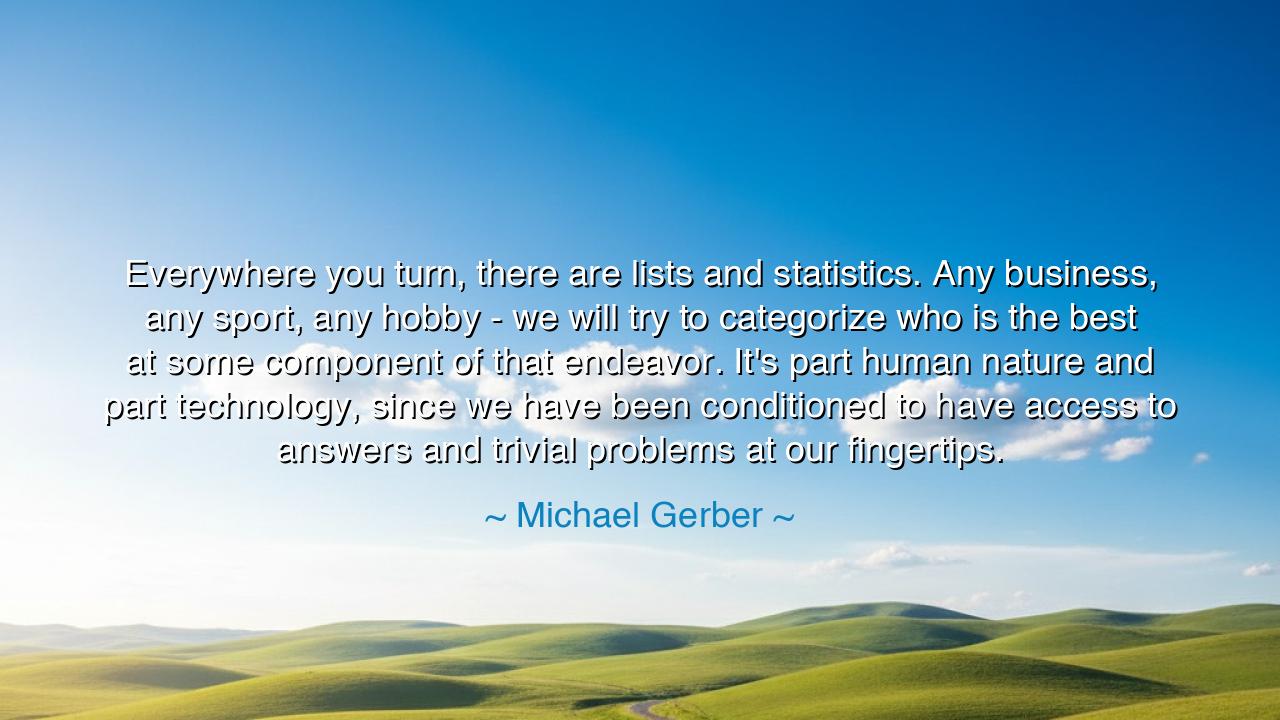
Everywhere you turn, there are lists and statistics. Any
Everywhere you turn, there are lists and statistics. Any business, any sport, any hobby - we will try to categorize who is the best at some component of that endeavor. It's part human nature and part technology, since we have been conditioned to have access to answers and trivial problems at our fingertips.






In the words of Michael Gerber, a seeker of truth in the realm of business and human behavior, we hear a reflection upon both our nature and our age: “Everywhere you turn, there are lists and statistics. Any business, any sport, any hobby—we will try to categorize who is the best at some component of that endeavor. It’s part human nature and part technology, since we have been conditioned to have access to answers and trivial problems at our fingertips.” His words strike at the heart of a modern paradox: the endless hunger to measure, compare, and rank, born of ancient instincts yet amplified by the tools of our time.
For it is true: mankind has always sought to know who stands above the rest. The Greeks crowned their champions in the Olympic Games, inscribing their names in stone so all would remember. The Romans kept records of generals, victories, and the spoils of war, that each might be weighed against another. In commerce, kings compared treasuries, and in learning, philosophers debated who spoke with greater wisdom. This impulse to categorize is no accident, but the echo of a deeper need: the desire to find meaning through comparison, to locate excellence amidst the ordinary.
Yet what was once the careful work of scribes and heralds has now been multiplied a thousandfold by technology. Where once only a few records existed, today every fragment of life may be ranked: the greatest athlete, the richest entrepreneur, the most popular song. We carry this knowledge not in scrolls but in the small glowing devices in our hands, and with a touch we summon answers to questions both great and trivial. This ease has shaped us, as Gerber says, conditioning us to seek always the quick judgment, the definitive ranking, the illusion of certainty in the form of lists.
But here lies the danger: while statistics and lists reveal much, they can also blind us. For greatness is not always captured in numbers. The poet may never be ranked, yet his words may heal generations. The mother raising her children will not appear on lists of achievement, yet her quiet labor shapes the destiny of nations. When we worship too deeply the act of categorization, we risk forgetting the unseen, the immeasurable, the virtues that cannot be captured by score or statistic.
Remember the tale of Galileo Galilei, who in his day was condemned not because his numbers were wrong, but because he dared to see differently. The rulers of his time had their own lists, their own categories of what was true, and within them his discoveries did not fit. Thus, while lists may help us grasp the surface of reality, true wisdom demands that we see beyond them, into the unmeasured depths.
The meaning of Gerber’s words, then, is twofold. First, he shows us that this constant drive to compare and rank is part of human nature itself, the instinct to understand ourselves by placing our lives within order. Second, he reveals that our modern technology has magnified this impulse, making comparison not an occasional tool, but a daily habit that defines how we view the world. His warning lies quietly between the lines: do not confuse the list for the truth, nor the statistic for the whole of reality.
The lesson for us is clear: use lists and statistics wisely, but do not let them enslave your vision. Celebrate excellence, but do not forget the value of what is unmeasured. Train yourself to see not only the champions of the scoreboard, but also the unseen heroes in silence. And in your own life, do not waste your soul comparing endlessly with others; instead, measure yourself against your own growth, your own journey, your own becoming.
So live as the ancients counseled: honor the tools of knowledge, but never mistake them for wisdom. For answers at your fingertips may satisfy the mind, but patience, reflection, and humility are what nourish the soul. Let Gerber’s words remind you that the true measure of life cannot be fully captured in rankings or records, but only in the depth of your character, the richness of your deeds, and the love you leave behind.






AAdministratorAdministrator
Welcome, honored guests. Please leave a comment, we will respond soon